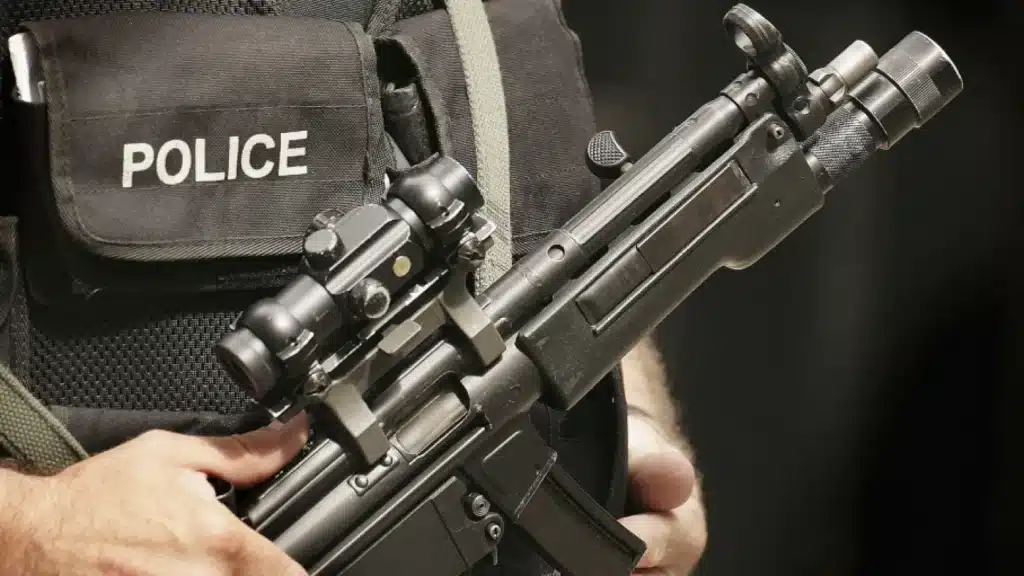
CBS Investigation Uncovers Police Selling Military-Grade Weapons to Criminals

By Rated Red News Team
America’s heartland prides itself on law and order, but a shocking new investigation by CBS News has uncovered a disturbing trend: police officers and small-town departments exploiting their authority to run illegal gun rackets. From sleepy Adair, Iowa, to the coasts of California, law enforcement officials have been selling restricted firearms—some capable of battlefield destruction—for personal profit. And the impact is deadly.
Small Town, Big Firepower
Adair, Iowa, population 794, raised eyebrows when its three-person police department requested 90 machine guns, including a Gatling-style M134 capable of firing 6,000 rounds per minute. What was a tiny town like Adair doing with military-grade weaponry? Turns out, Police Chief Bradley Wendt wasn’t arming his officers—he was arming his wallet.
Federal agents discovered Wendt used his position to acquire and resell these weapons at steep markups. Convicted earlier this year, Wendt now faces five years in prison. But he’s unapologetic: “If I’m guilty of this, every cop in the nation’s going to jail,” he told CBS News.
A Nationwide Epidemic
Wendt’s case is part of a troubling pattern spanning 23 states. Over the last 20 years, dozens of sheriffs, chiefs, and officers have been caught illegally selling firearms, often at 10 times their purchase price. These aren’t hunting rifles—they’re military-grade weapons, including machine guns, grenade launchers, and short-barreled rifles.
Court records reveal these guns often end up in the wrong hands: violent felons, drug cartels, and international arms dealers. In one chilling case, a gun sold by a cop was used to kill a 14-year-old boy at a high school football game.
The Dark Web of Gun-Running
Some schemes are as brazen as they are alarming. In New Mexico, a smuggling ring involving a police chief, a mayor, and a village trustee supplied automatic weapons to a Mexican cartel. Another operation connected a sanctioned Russian arms dealer to U.S. police chiefs and a Delta Force veteran. The scale? Hundreds of guns and millions in profits.
Online forums frequented by gun enthusiasts even share tips on roping police into the trade. One poster bragged about using high school connections with law enforcement to funnel weapons, while another detailed turning a $10,000 machine gun into a $75,000 windfall.
No Accountability, No Problem
How does this happen? A glaring lack of oversight. Federal agencies like the Bureau of Alcohol, Tobacco, Firearms and Explosives (ATF) have failed to audit law enforcement weapon requests. Until January 2023, the ATF didn’t even verify whether machine gun requests were legitimate. In Iowa alone, over 1,200 machine guns are registered to law enforcement, and not a single request was denied in five years.
Even when caught, many officers get off lightly. One California cop sold over 100 illegal guns and kept his Porsche after serving less than a year in prison. Meanwhile, another officer ran a 20-year scheme out of his car trunk, stockpiling over 250 firearms.
Weapons of War in Your Backyard
Restricted weapons, classified as “post-1986” firearms, are designed for military use only. They include guns that can fire rounds faster than the speed of sound, penetrate armored tanks, and hit targets a mile away. Yet loopholes allow small-town cops to stockpile these weapons and profit by exploiting federal processes.
The fallout from these schemes isn’t just financial. It’s fueling violence in our communities. Between 2017 and 2021, nearly 26,000 guns traced from crime scenes originated from law enforcement or military sources.
Turning a Blind Eye
The ATF has largely avoided prosecuting police involved in illegal gun sales. A 2017 memo revealed that the agency preferred “to educate, not investigate” law enforcement, despite identifying a “growing trend” of officers flipping restricted firearms for profit.
“We’re not looking to prosecute fellow law enforcement officers,” said Eric Harden, a former ATF special agent, who warned that leniency could erode public trust. Yet warnings are rarely enough. When officers persist—and when their guns lead to crimes—accountability often falls by the wayside.
What’s Next?
The scale of this problem is enormous, and the federal government has been slow to act. While agencies like ICE have lost track of $100 million worth of guns and ammunition, public disclosure of law enforcement arsenals remains tightly restricted. CBS News is suing the ATF for transparency, but so far, the agency remains silent.
As these weapons proliferate, so does the risk to everyday Americans. Military-grade firepower doesn’t belong in small towns—or the wrong hands. This isn’t just a story about corrupt cops; it’s about a system that allows power to be abused at the expense of public safety.
For the heartland’s law-abiding citizens, this raises an urgent question: Who’s protecting us when those sworn to serve are fueling the fire?





